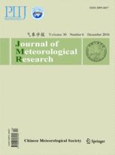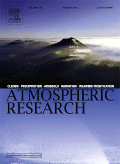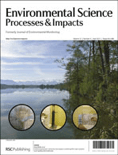
Tropical Cyclone Research and Review
Scope & Guideline
Exploring the Impact of Nature's Fury
Introduction
Aims and Scopes
- Tropical Cyclone Dynamics and Mechanisms:
Research on the physical processes governing the formation, intensification, and structure of tropical cyclones, including studies on boundary layer characteristics, moisture origin during rapid intensification, and the effects of urbanization. - Forecasting Techniques and Technologies:
Development and evaluation of advanced forecasting methods, including the integration of AI and machine learning, satellite data assimilation, and operational forecasting models, focusing on improving prediction accuracy and reducing forecast errors. - Impact Assessment and Risk Management:
Exploration of the socio-economic impacts of tropical cyclones, including hazard assessment, risk reduction strategies, and the influence of climate change on cyclone behavior and intensity. - Interdisciplinary Approaches to Tropical Cyclones:
Encouragement of interdisciplinary research that combines meteorology, hydrology, urban planning, and disaster management to address the complexities of cyclone-related challenges.
Trending and Emerging
- AI and Big Data in Forecasting:
An increasing focus on applying artificial intelligence and big data analytics to improve forecasting accuracy and disaster preparedness, reflecting a trend towards leveraging technology for enhanced predictive capabilities. - Urbanization and Its Impact on Cyclone Dynamics:
Research examining the effects of urbanization on cyclone intensity and associated hazards is gaining prominence, highlighting the intersection of urban planning and meteorological science. - Climate Change Impacts on Cyclones:
A surge in studies investigating how climate variability and anthropogenic climate change are affecting cyclone behavior, intensity, and frequency, underscoring the relevance of climate science in understanding future cyclone risks. - Multi-hazard Risk Assessment:
Emerging themes around integrating multi-hazard risk assessments into cyclone research to better understand the compound effects of cyclones and other natural disasters, fostering a comprehensive approach to disaster risk reduction.
Declining or Waning
- Historical Case Studies:
Research focusing on historical events and case studies of past cyclones has decreased, possibly due to a shift towards real-time forecasting and predictive modeling that prioritize contemporary challenges. - Basic Theoretical Models:
There is a noticeable reduction in publications centered on basic theoretical models of tropical cyclones, as the field has moved towards more complex, data-driven methodologies that leverage advanced technology. - General Climate Trends Without Specific Focus:
Papers that broadly address climate trends in relation to tropical cyclones without specific case studies or focused methodologies have become less frequent, indicating a move towards more targeted and actionable research.
Similar Journals

Journal of Meteorological Research
Navigating the Future of Weather Science.The Journal of Meteorological Research, published by SPRINGER HEIDELBERG, stands as a vital resource in the fields of Atmospheric Science and Ocean Engineering, boasting an impressive impact factor that reflects its scholarly significance. With its ISSN 2095-6037 and E-ISSN 2198-0934, the journal offers an open access platform, fostering accessibility and dissemination of cutting-edge research. Established in 2014 and running through to 2024, it is particularly distinguished in 2023 as Q2 in Atmospheric Science and Q1 in Ocean Engineering, underscoring its important contributions to these disciplines, with remarkable rankings in Scopus that place it in the top tiers of both categories. The journal accepts a broad range of research articles, reviews, and innovative methodologies, catering to a diverse audience of researchers, professionals, and students eager to advance their knowledge and expertise in meteorological studies. This makes the Journal of Meteorological Research an essential platform for anyone engaged in understanding and addressing the complex challenges of our changing climate.

Atmospheric Research
Exploring the Dynamics of Our AtmosphereAtmospheric Research is a premier journal published by Elsevier Science Inc, specializing in the field of Atmospheric Science. With a commendable impact factor, it holds a distinguished position in the Scopus rankings, being placed 14th out of 148 journals within its category and achieving a remarkable 90th percentile rank. This journal serves as a vital outlet for rigorous research on atmospheric processes, climate variability, and meteorological phenomena, providing a platform for scientists, researchers, and students to disseminate their findings and contribute to the advancement of knowledge in this critical field. Although it is not an open-access journal, its strong reputation and selective publication criteria ensure that only high-quality and impactful studies are featured. Since its inception in 1986, Atmospheric Research has continuously evolved to meet the dynamic nature of atmospheric studies, making it a fundamental resource for anyone engaged in understanding and addressing atmospheric challenges worldwide.

Journal of Southern Hemisphere Earth Systems Science
Advancing Knowledge in Atmospheric Science and Oceanography.The Journal of Southern Hemisphere Earth Systems Science, published by CSIRO PUBLISHING, stands as a pivotal resource for researchers and professionals in the fields of Atmospheric Science, Global and Planetary Change, and Oceanography. Established in 2016 and operating under an Open Access model since 2019, this journal provides a platform for innovative research and critical discourse on earth systems in the Southern Hemisphere. It has achieved impressive rankings with a Q1 classification across key disciplines and is recognized in Scopus with significant percentile rankings, showcasing its influence and relevance within the scientific community. The journal is dedicated to fostering scholarship that addresses the complex interactions of earth systems, offering valuable insights for those engaged in environmental science and sustainability initiatives. Its commitment to facilitating open access resources makes it an invaluable tool for researchers and students alike, striving to enhance our understanding of global environmental changes.

Journal of Climate Change
Uniting voices in the fight against climate change.The Journal of Climate Change, published by IOS PRESS, is a premier academic platform dedicated to the multidisciplinary investigation of climate change, its impacts, and mitigation strategies. With a focus on promoting innovative research, this journal aims to cultivate dialogue among researchers, policymakers, and environmental professionals globally. While the impact factor signifies its academic significance, the journal prides itself on providing unrestricted access to cutting-edge research insights, fostering collaboration within the scientific community. The journal’s ISSN is 2395-7611, and the E-ISSN is 2395-7697. Whether you are a seasoned researcher or a student exploring the critical implications of climate change, the Journal of Climate Change serves as an essential resource for the latest findings and discussions in this vital field.

JOURNAL OF HYDROMETEOROLOGY
Charting New Territories in HydrometeorologyJOURNAL OF HYDROMETEOROLOGY, published by the American Meteorological Society, is a leading scholarly journal that serves as a vital resource within the field of atmospheric science. With its ISSN 1525-755X and E-ISSN 1525-7541, this journal provides a platform for the dissemination of high-impact research, currently holding a prestigious Q1 ranking in Atmospheric Science as per the 2023 Category Quartiles. It enjoys an excellent reputation, ranked #30 out of 148 in the Scopus listings, placing it in the top 80th percentile within Earth and Planetary Sciences. Publishing rigorous and innovative studies from 2000 to 2024 and beyond, the journal addresses critical topics including weather forecasting, climate dynamics, and hydrological processes, making it essential reading for researchers, professionals, and students alike. Though not an open-access journal, it continues to enrich the academic community with quality contributions dedicated to advancing our understanding of hydrometeorological phenomena.

Atmospheric Science Letters
Connecting researchers to the pulse of atmospheric science.Atmospheric Science Letters, published by WILEY, is a leading open-access journal in the field of Atmospheric Science. Since its establishment in 2000, it has significantly contributed to advancing knowledge related to the Earth's atmosphere, focusing on both theoretical and practical aspects. With an impressive Q2 ranking in the Atmosphere Science category as of 2023 and a Scopus rank of 62 out of 148, this journal provides a platform for researchers and professionals to share their findings and insights. The journal’s commitment to open access since 2016 ensures that cutting-edge research is accessible to a global audience, fostering collaboration and innovation in the atmospheric sciences. Addressed from its headquarters at 111 River St, Hoboken, NJ, USA, Atmospheric Science Letters is pivotal for students, researchers, and professionals seeking to stay abreast of the latest developments in this dynamic field.

Cuadernos de Investigacion Geografica
Connecting Researchers for a Sustainable FutureCuadernos de Investigacion Geografica, published by UNIV RIOJA, SERV PUBLICACIONES, stands as a premier open-access journal dedicated to advancing knowledge in the fields of geography, environmental science, and earth sciences. Since its inception in 1983, this journal has fostered innovative research and critical discourse, currently holding a distinguished position in Scopus with impressive quartile rankings, including Q2 in both Earth and Planetary Sciences, and Geography, Planning and Development, reflecting its impact and relevance. With an aim to present high-quality, peer-reviewed articles that contribute to the understanding of our planet and its systems, Cuadernos de Investigacion Geografica welcomes submissions from researchers, professionals, and students alike, fostering a collaborative environment that spans across diverse geographical contexts. Operating from its hub in Logroño, Spain, this journal continues to be a vital resource for anyone engaged in geographical research and environmental analysis, providing open access to enhance knowledge sharing and innovation in these dynamic fields.

BOIS ET FORETS DES TROPIQUES
Illuminating the Richness of Tropical ForestsBOIS ET FORETS DES TROPIQUES is a distinguished journal published by CIRAD-CENTRE COOPERATION INT RECHERCHE AGRONOMIQUE POUR, based in France. The journal is committed to disseminating high-quality research in the domains of ecology, forestry, and environmental science, reflected by its impressive ranking in multiple Scopus categories, including Q2 in Forestry and Q3 in Ecology. With an ISSN of 0006-579X and an e-ISSN of 1777-5760, BOIS ET FORETS DES TROPIQUES serves as a vital platform for scholars and practitioners to explore and share insights about tropical forests and their ecosystems. Although it operates under a subscription model without open access options, the journal plays a crucial role in advancing research and practices essential for sustainable forest management and biodiversity conservation in tropical regions. Its ongoing publication from 2010 to 2024 ensures a continuous contribution to the academic community, fostering a deeper understanding of ecological dynamics and promoting innovative approaches within the field.

Environmental Science-Processes & Impacts
Empowering voices in environmental science and policy.Environmental Science-Processes & Impacts is a premier journal published by the Royal Society of Chemistry, focusing on critical research in the field of environmental science. With ISSN 2050-7887 and E-ISSN 2050-7895, this journal has established itself as an authoritative source of knowledge since its inception in 2012, maintaining a remarkable Q1 quartile ranking across significant categories such as Environmental Chemistry, Management, Monitoring, Policy and Law, Medicine, and Public Health for the year 2023. It stands as an essential resource for professionals, researchers, and students, aimed at advancing scientific understanding and solutions to pressing environmental issues. With impressive ranks in Scopus, including #45 in Public Health and #27 in Environmental Chemistry, the journal provides a platform for impactful research and interdisciplinary collaboration, emphasizing open access to foster the dissemination of knowledge globally. Join a community committed to exploring the interconnectedness of environmental processes and their implications for society by contributing to or learning from cutting-edge studies published in this esteemed journal.

ADVANCES IN ATMOSPHERIC SCIENCES
Shaping the Future of Climate ScienceADVANCES IN ATMOSPHERIC SCIENCES is a highly esteemed journal published by SCIENCE PRESS, dedicated to advancing the field of atmospheric sciences. With an impressive impact factor and ranking as Q1 in Atmospheric Science as of 2023, this journal serves as a leading platform for researchers, professionals, and students to disseminate substantial findings and innovative methodologies across various topics within the atmospheric sciences domain. Established in 1984 and continuously publishing through to 2024, it has successfully positioned itself among the top ranks, currently standing at #17 out of 148 in the Scopus category, highlighting its significance in the field with a remarkable 88th percentile. Although it operates under traditional access, the journal provides invaluable insights into climate dynamics, meteorology, and environmental processes that are crucial for both academic and practical applications. Based in Beijing, China, ADVANCES IN ATMOSPHERIC SCIENCES is committed to fostering a global dialogue and collaboration among scholars and industry experts, making it an essential resource for those invested in understanding and addressing contemporary atmospheric challenges.